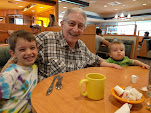Loving to Hope
I’m composing this message on Mary’s birthday. I have the time because she has chosen to spend her special day doing what she most enjoys doing: increasing and improving her skills as a teacher. She’s attending a class today that she registered for last November, typically not paying a lot of attention to the fact that it was scheduled for the anniversary of the day she was born. Next month Mary and I will have been married for thirty-three years, and I am finally beginning to realize that this time has been an ongoing practicum in the lessons of love.
Both twenty-one (do the math correctly and you’ll figure out which birthday she’s celebrating :-) I don’t think either one of us knew exactly what to expect of the future. About the only thing we really knew for sure was that we loved each other, and this was grounds for committing to a lifetime together. Too, I don’t think that we understood at the time that while the quantitative aspects of our love would theoretically remain constant, the qualitative aspects would be continually and dynamically influenced. The best example I can think of to explain what I mean by this are Rachel and Rebecca, each of whom has significantly shaped and molded Mary’s and my original love in new and unforeseen ways.
Another aspect of love that I had not anticipated was how much work it can sometimes be. I say this with a most positive tone, but while the early and exhilarating stages seemed to flow effortlessly, the new dimension of maintenance that inevitably appeared as our marriage matured required more intentional attention from both of us. I can honestly say (and I hope that Mary can, too) that there has not been a day since our vows that I haven’t loved her, but there have definitely been times in which the circumstances of the moment made it more difficult to be mindful of that truth. We are part of a generation that has come to accept those difficult and challenging moments as grounds for separation and divorce, apparently not seeing them as part of the loving process as well.
In an attempt to identify the cause for those times when the love-consciousness is somehow sublimated, I have discovered that they most usually occur when what I refer to as the scriptural triad (love of God, love of neighbor, love of self) gets out of balance. Rarely is this a matter of loving God or another person too much. And it’s usually not an imbalance resulting from what could be termed a healthy love of self. The loving relationship most often gets thrown out of whack whenever I pervert the definition of what constitutes genuine self-love to a selfish pseudo-philosophy of “me first and only.”
Slipping into this frame of mind happens with frightening ease as it is culturally reinforced by the multitudinous variations of “taking care of Number One” that our consumer society constantly bombards us with. Even the consumer theology of our times emphasizes as all-important the aspect of personal salvation to the neglect of focusing on what is required to love God and neighbor. Spouses, children, coworkers, and eventually everyone but “me” become excess baggage and inconvenient nuisances as we attempt to satisfy the insatiable quest for self-gratification and fulfillment in the mistaken name of loving ourselves.
It is this misguided quest to serve self that ultimately robs us of any sense of hope. For as long as I invest everything in my finite self I gradually slip deeper into the despair of hopelessness. However, for as long as I have a future that consists of being in a truly loving relationship with others – not the least of which is God – there is eternal hope. The world’s great religions are unanimous in their affirmation of this truth: true love is the source of genuine hope. The disparities arise from the misunderstandings and incorrect definitions of what constitutes authentic love.
This brings me back to what Mary and I have been working on for over three decades now. I don’t mean to make it sound so clinically sterile, because our marriage has been anything but that. But we continue to learn the lessons of love, and in so doing replenish and renew our hope in and for the future. In a world so filled with hatred and conflict that it seems virtually impossible, there perhaps has never been a time when humankind more needs to hear – and critically more important, to put into practice – the words of the Christ, “This is my order to you: You are to love each other just as I loved you.” (John 15:12 SV) Amen.

